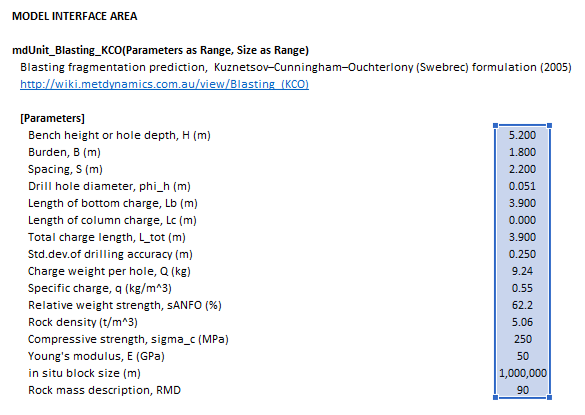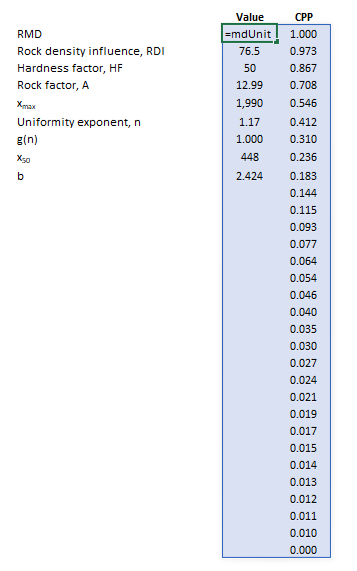Blasting (KCO): Difference between revisions
Jump to navigation
Jump to search
imported>Scott.Munro m (→Model theory) |
imported>Scott.Munro m (→Model theory) |
||
| Line 5: | Line 5: | ||
== Model theory == | == Model theory == | ||
{{Restricted content}} | |||
<hide> | |||
=== Swebrec distribution === | === Swebrec distribution === | ||
| Line 116: | Line 119: | ||
* <math>H</math> is the bench height or hole depth (m) | * <math>H</math> is the bench height or hole depth (m) | ||
* <math>\mathit{SD}</math> is the standard deviation of drilling accuracy (m). | * <math>\mathit{SD}</math> is the standard deviation of drilling accuracy (m). | ||
</hide> | |||
== Excel == | == Excel == | ||
Revision as of 09:54, 4 December 2024
Description
This article describes the Kuznetsov–Cunningham–Ouchterlony (KCO) model (Ouchterlony, 2005) for predicting rock fragmentation by blasting.[1]
Model theory
Excel
The KCO blasting model may be invoked from the Excel formula bar with the following function call:
=mdUnit_Blasting_KCO(Parameters as Range, Size as Range)
Invoking the function with no arguments will print Help text associated with the model, including a link to this page.
Inputs
The required inputs are defined below in matrix notation with elements corresponding to cells in Excel row ([math]\displaystyle{ i }[/math]) x column ([math]\displaystyle{ j }[/math]) format:
- [math]\displaystyle{ Parameters= \begin{bmatrix} H\text{ (m)}\\ B\text{ (m)}\\ S\text{ (m)}\\ \varnothing_{\rm h}\text{ (m)}\\ L_{\rm b}\text{ (m)}\\ L_{\rm c}\text{ (m)}\\ L_{\rm Tot}\text{ (m)}\\ \mathit{SD}\text{ (m)}\\ Q\text{ (kg)}\\ q\text{ (kg/m}^3\text{)}\\ s_{\rm ANFO}\text{ (}%\text{)}\\ \rho\text{ (t/m}^3\text{)}\\ \sigma_{\rm c}\text{ (MPa)}\\ E\text{ (GPa)}\\ \textit{In}\text{ }\textit{situ}\text{ block size (m)}\\ \mathit{RMD}\\ \end{bmatrix},\;\;\;\;\;\; Size = \begin{bmatrix} d_{1}\text{ (mm)}\\ \vdots\\ d_p\text{ (mm)}\\ \end{bmatrix} }[/math]
Results
The results are displayed in Excel as an array corresponding to the matrix notation below:
- [math]\displaystyle{ \mathit{mdUnit\_Blasting\_KCO} = \begin{bmatrix} \begin{bmatrix} \mathit{RMD}\\ \mathit{RDI}\\ \mathit{HF}\\ x_{\rm max}\text{ (mm)}\\ n\\ g(n)\\ x_{50}\text{ (mm)}\\ b\\ \end{bmatrix} & \begin{array}{c} \begin{bmatrix} \mathit{P}_1\text{ (w/w)}\\ \vdots\\ \mathit{P}_p\text{ (w/w)} \end{bmatrix} \\ \\ \\ \\ \end{array} \end{bmatrix} }[/math]
Example
The images below show the selection of input arrays and output results in the Excel interface.
See also
References
- ↑ Ouchterlony, F., 2005. The Swebrec© function: linking fragmentation by blasting and crushing. Mining Technology, 114(1), pp.29-44.


